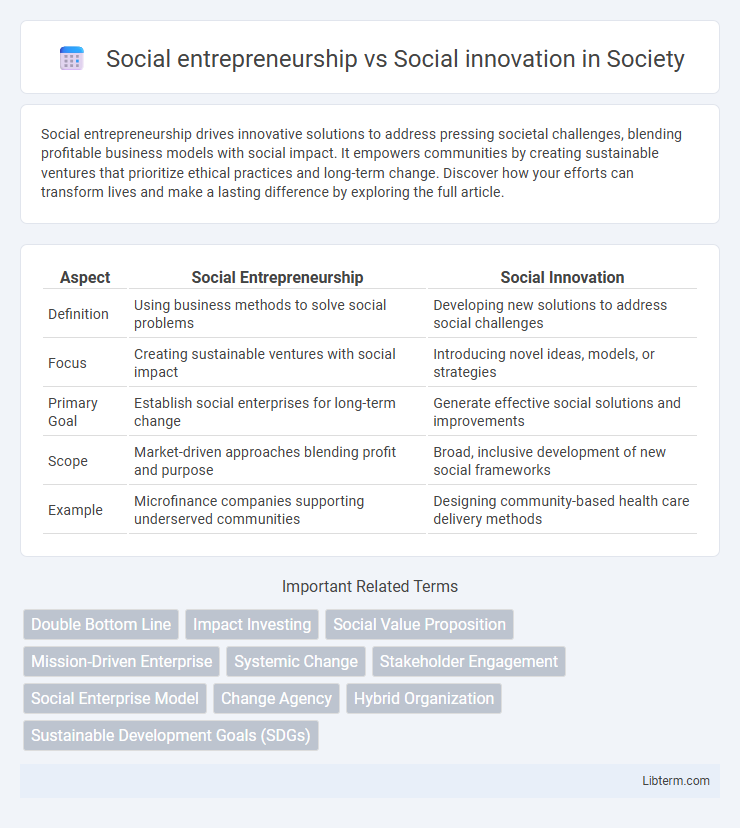Social entrepreneurship drives innovative solutions to address pressing societal challenges, blending profitable business models with social impact. It empowers communities by creating sustainable ventures that prioritize ethical practices and long-term change. Discover how your efforts can transform lives and make a lasting difference by exploring the full article.
Table of Comparison
| Aspect | Social Entrepreneurship | Social Innovation |
|---|---|---|
| Definition | Using business methods to solve social problems | Developing new solutions to address social challenges |
| Focus | Creating sustainable ventures with social impact | Introducing novel ideas, models, or strategies |
| Primary Goal | Establish social enterprises for long-term change | Generate effective social solutions and improvements |
| Scope | Market-driven approaches blending profit and purpose | Broad, inclusive development of new social frameworks |
| Example | Microfinance companies supporting underserved communities | Designing community-based health care delivery methods |
Defining Social Entrepreneurship
Social entrepreneurship involves creating and leading organizations that address social problems through sustainable business models, emphasizing impact-driven ventures. Social innovation refers to the development and implementation of novel solutions, methods, or products that improve social outcomes but may not require the formation of a new entity. Defining social entrepreneurship centers on blending entrepreneurial principles with social impact goals to build scalable and financially viable enterprises.
Understanding Social Innovation
Social innovation involves developing and implementing novel solutions to address pressing social challenges, emphasizing creativity and systemic change. Unlike social entrepreneurship, which primarily focuses on building sustainable ventures to drive social impact, social innovation prioritizes the ideation and diffusion of breakthrough approaches that transform existing social practices. Understanding social innovation requires recognizing its role in empowering communities, enhancing social inclusion, and fostering scalable models that solve complex societal problems effectively.
Key Differences Between Social Entrepreneurship and Social Innovation
Social entrepreneurship involves creating and managing ventures that address social problems through sustainable business models, whereas social innovation refers to the development and implementation of new ideas, products, or processes that directly tackle social challenges. Key differences include social entrepreneurship's emphasis on organizational leadership and financial viability, while social innovation focuses on novel solutions that can be adopted across various sectors. Social entrepreneurship often drives social innovation by scaling impactful ideas into practical, market-driven enterprises.
Core Principles of Social Entrepreneurship
Social entrepreneurship centers on leveraging innovative business models to address social issues, emphasizing sustainability, impact measurement, and community empowerment as core principles. Unlike social innovation, which focuses broadly on generating novel solutions regardless of the organizational structure, social entrepreneurship integrates market-driven approaches with social missions to create scalable change. The core principles include a deep commitment to social value creation, resourcefulness in mobilizing assets, and accountability to stakeholders for measurable social outcomes.
Core Principles of Social Innovation
Social innovation centers on creating novel solutions to social problems that are more effective, efficient, sustainable, or just than existing approaches, emphasizing empathy, collaborative networks, and iterative prototyping. Core principles include user-centered design, systemic change, scalability, and impact measurement to ensure long-term social value and adaptability. Social entrepreneurship often applies these principles by launching ventures that integrate social impact with business models, but social innovation broadly encompasses new ideas beyond traditional entrepreneurial frameworks.
Role of Impact in Social Entrepreneurship and Social Innovation
Social entrepreneurship drives impact through the creation and scaling of sustainable ventures that address social challenges, prioritizing measurable outcomes and long-term change. Social innovation focuses on developing novel solutions and processes that transform social systems, emphasizing adaptability and widespread adoption to generate systemic impact. Both fields rely on impact as a core metric, but social entrepreneurship channels impact into enterprise activities, while social innovation embeds impact within transformative solutions.
Real-World Examples: Social Entrepreneurship vs. Social Innovation
Social entrepreneurship involves creating and leading organizations that address social issues through sustainable business models, such as Grameen Bank's microfinance initiatives empowering low-income populations. Social innovation focuses on developing novel solutions or approaches to social problems, exemplified by the introduction of mobile health clinics improving access to healthcare in remote areas. Both approaches drive impactful change, with social entrepreneurship scaling actionable ventures and social innovation fostering creative methods to solve community challenges.
Benefits and Challenges of Each Approach
Social entrepreneurship drives societal change through mission-driven businesses that create sustainable revenue streams while addressing social issues, benefiting communities by fostering economic empowerment and innovation. Challenges include securing consistent funding and balancing social impact with financial viability. Social innovation introduces novel solutions or practices to complex social problems, enhancing effectiveness and scalability, but faces obstacles like resistance to change and difficulties in measuring long-term impact.
How Social Entrepreneurship and Social Innovation Work Together
Social entrepreneurship drives the creation of sustainable ventures that address social challenges through innovative business models. Social innovation generates new ideas, products, or methods that improve social outcomes and often serve as the foundation for social entrepreneurial activities. Together, they combine creativity and enterprise to scale impactful solutions that transform communities and markets.
Choosing the Right Pathways for Social Impact
Social entrepreneurship involves creating sustainable ventures addressing social issues through market-driven solutions, emphasizing business models that generate both financial returns and social value. In contrast, social innovation focuses on developing novel ideas, products, or processes that improve societal well-being, often implemented through collaborative or policy-driven initiatives. Choosing the right pathway depends on aligning organizational goals with desired outcomes, resources, and stakeholder engagement to maximize social impact effectively.
Social entrepreneurship Infographic

 libterm.com
libterm.com